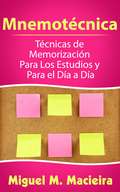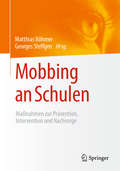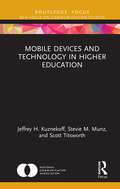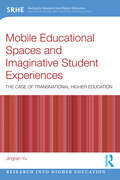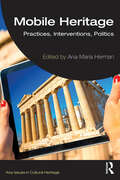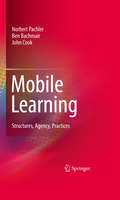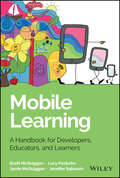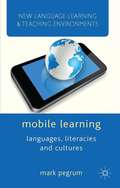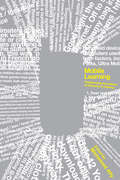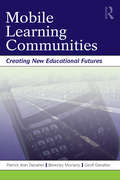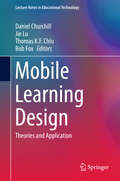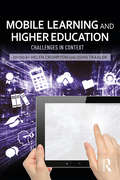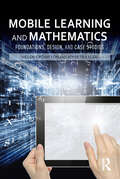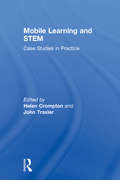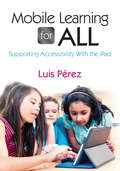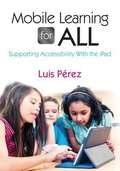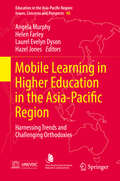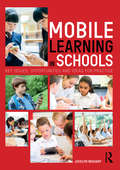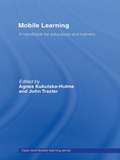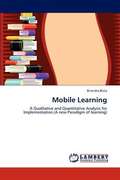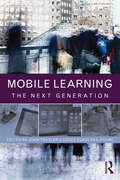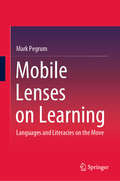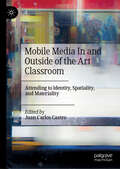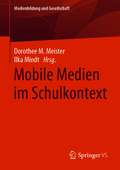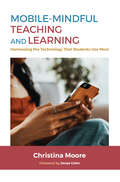- Table View
- List View
Mnemotécnica: Técnicas de Memorización Para los Estudios y Para el Día a Día
by Marcela Gutiérrez Bravo Miguel M. MacieiraUna memoria pobre es, sin duda, una gran desventaja para los estudiantes y los profesionales, al final, todos tenemos que recordar una infinidad de información para tener éxito en los estudios o en la carrera. Una buena noticia es que, prácticamente, cualquier persona puede mejorar su memoria a través de ejercicios físicos, de manutención de la salud y, también, de técnicas de memorización. En este libro, hablaremos con más detalles sobre las técnicas de memorización, conocidas, en su conjunto, como mnemotécnica. Es importante notar que la mnemotécnica puede ser usada por cualquiera, independientemente de su edad u ocupación profesional.
Mobbing an Schulen: Maßnahmen zur Prävention, Intervention und Nachsorge
by Matthias Böhmer Georges SteffgenMobbing stellt an Schulen ein weit verbreitetes Problem dar. Dieses Buch liefert zum einen aktuelle Erklärungsansätze für das Phänomen Mobbing an Schulen. Es wird aufgezeigt, dass Mobbing nicht nur zwischen Opfern und Tätern stattfindet, sondern dass in der Regel alle Mitglieder einer Schulklasse beteiligt sein können. Entsprechend wird beschrieben, welche Folgen Mobbing für alle Beteiligte haben kann. Zum anderen werden allgemeine Präventions- und Interventionsansätze beschrieben sowie elf Anti-Mobbing-Programme detailliert vorgestellt. Einen besonderen Fokus richtet das Buch auf Mobbingnachsorgekonzepte sowie praxisbezogene Exkurse von ausgewiesenen Experten.
Mobile Devices and Technology in Higher Education: Considerations for Students, Teachers, and Administrators (NCA Focus on Communication Studies)
by Scott Titsworth Jeffrey H. Kuznekoff Stevie M. MunzThis book examines key issues at the intersection of education and technology by addressing the question that most educators face—how do we use technology to engage students in the learning process and enhance learning? Problematizing the view that technology is the default solution to a host of problems facing education, while also recognizing that technology has an important place in a variety of education levels, the book provides readers with clear insights on technology and learning from a variety of perspectives from communication studies, education, and related disciplines. This volume is an essential read for scholars and teachers working in the area of elementary education. It will also be of interest to academics working in the area of education, postsecondary education, and learning and can be used as an ancillary text in graduate-level seminars.
Mobile Educational Spaces and Imaginative Student Experiences: The Case of Transnational Higher Education (Research into Higher Education)
by Jingran YuBringing together interdisciplinary perspectives from sociology, education, and human geography to investigate the space, community, and culture at an International Branch Campus, this fascinating book provides empirical evidence to understand the implications for students’ future socio-spatial mobilities.Drawing on ethnographic data from a British International Branch Campus in China this book offers a timely discussion about transnational higher education. It illustrates the mobility of the educational space, where mobilities and materiality converge and are mediated by transnational imaginations. Students are portrayed as ‘imaginative travellers’, who may not have been physically abroad but are imaginatively mobilised by transnational material, social and cultural flows on campus. This book demonstrates how imaginative mobility cultivates students’ cosmopolitan orientations and competence, while acknowledging how structural constraints weave unevenness into the imaginative flows that arise and respond to the socio-spatial inequalities in global education landscapes. This study also offers empirical insights into China’s approach to transnational education that informs both research and policy.This book is valuable reading for scholars, students, researchers and practitioners in higher education, particularly for those with an interest in educational studies, sociology, and human geography.
Mobile Heritage: Practices, Interventions, Politics (Key Issues in Cultural Heritage)
by Ana-Maria HermanMobile Heritage explores how diverse digital technologies (such as apps, GPS, games, social platforms, NFTs, drones, AR, MR and AI, among others) have allowed for new types of mobilities and introduced a novel set of practices, interventions, and politics for heritage collections, archives, exhibitions, entertainment, conservation, management, commerce, education, restitution, activism, and regulation.The volume is not a ‘how to’ book. Instead, it critically examines this emerging landscape and its unsettling of existing relations between heritage and knowledge, value, identity, power, sense of place, community, nationhood, and ownership – thus outlining a new set of issues, implications, and consequences. The volume brings together case studies from around the world and each chapter considers mobility matters associated with tangible and intangible cultural heritage (relating to art, film, music, games, manuscripts, traditional knowledge, architecture, cities, and more) and the involvement of a variety of actors in digital heritage practices and interventions (such as artists, activists, communities, museums, non-profit organisations, educational institutions, enterprises and governmental agencies). The contributors are scholars and practitioners drawing on various disciplines and fields of study, including archaeology, museum studies, media studies, computing, art history, cultural studies, anthropology, gender studies, mobility studies, and law.Mobile Heritage positions mobility as a critical tool for understanding the changing (digital) heritage landscape, making this volume an essential read for students, academics, and practitioners engaged in this area.
Mobile Learning
by Gunther Kress Norbert Pachler Ben Bachmair John CookAs with television and computers before it, today's mobile technology challenges educators to respond and ensure their work is relevant to students. What's changed is that this portable, cross-contextual way of engaging with the world is driving a more proactive approach to learning on the part of young people. The first full-length authored treatment of the relationship between the centrality of technological development in daily life and its potential as a means of education, Mobile Learning charts the rapid emergence of new forms of mass communication and their potential for gathering, shaping, and analyzing information, studying their transformative capability and learning potential in the contexts of school and socio-cultural change. The focus is on mobile/cell phones, PDAs, and to a lesser extent gaming devices and music players, not as "the next new thing" but meaningfully integrated into education, without objectifying the devices or technology itself. And the book fully grounds readers by offering theoretical and conceptual models, an analytical framework for understanding the issues, recommendations for specialized resources, and practical examples of mobile learning in formal as well as informal educational settings, particularly with at-risk students. Among the topics covered: * Core issues in mobile learning * Mobile devices as educational resources * Socioeconomic approaches to mobile learning * Creating situations that promote mobile learning * Ubiquitous mobility and its implications for pedagogy * Bridging the digital divide at the policy level Mobile Learning is a groundbreaking volume, sure to stimulate both discussion and innovation among educational professionals interested in technology in the context of teaching and learning.
Mobile Learning
by Jamie Mcquiggan Lucy Kosturko Jennifer Sabourin Scott McquigganExplore the game-changing technology that allows mobile learning to effectively reach K-12 students Mobile Learning: A Handbook for Developers, Educators and Learners provides research-based foundations for developing, evaluating, and integrating effective mobile learning pedagogy. Twenty-first century students require twenty-first century technology, and mobile devices provide new and effective ways to educate children. But with new technologies come new challenges--therefore, this handbook presents a comprehensive look at mobile learning by synthesizing relevant theories and drawing practical conclusions for developers, educators, and students. Mobile devices--in ways that the laptop, the personal computer, and netbook computers have not--present the opportunity to make learning more engaging, interactive, and available in both traditional classroom settings and informal learning environments. From theory to practice, Mobile Learning explores how mobile devices are different than their technological predecessors, makes the case for developers, teachers, and parents to invest in the technology, and illustrates the many ways in which it is innovative, exciting, and effective in educating K-12 students. Explores how mobile devices can support the needs of students Provides examples, screenshots, graphics, and visualizations to enhance the material presented in the book Provides developers with the background necessary to create the apps their audience requires Presents the case for mobile learning in and out of classrooms as early as preschool Discusses how mobile learning enables better educational opportunities for the visually impaired, students with Autism, and adult learners. If you're a school administrator, teacher, app developer, or parent, this topical book provides a theoretical, well-researched discussion of the pedagogical theory and mobile learning, as well as practical advice in setting up a mobile learning strategy.
Mobile Learning
by Mark PegrumThis book explores the use of mobile devices for teaching and learning language and literacies, investigating the ways in which these technologies open up new educational possibilities. Pegrum builds up a rich picture of contemporary mobile learning and outlines of likely future developments.
Mobile Learning Communities: Creating New Educational Futures
by Geoff Danaher Patrick Alan Danaher Beverley MoriartyMobile Learning Communities explores the diverse ways in which traveling groups experience learning ‘on the run’. This book provides empirical evidence that draws on the authors’ 17 years of continuing research with international occupational Travelers. It engages with themes such as workplace learning, globalization, multiliteracies, and emerging technologies which impinge on the ways mobile groups make sense of themselves as learning communities. International in focus, this book deals with an issue of increasing global significance and shows the complexities of the lives and learning experiences of such mobile cultures and their strategies for earning, learning, and living, thus challenging simplistic and stereotypical images of traveling groups still found in mainstream media and popular culture. Mobile Learning Communities brings together for the first time mobilities and learning communities into a single and comprehensive focus. It provides a detailed analysis of how mobile groups position themselves and how they are positioned by others. This text will appeal to scholars in the field of distance education and educational technology and to researchers in education, cultural studies, and sociology. It will also be of interest to educational instructors, policy-makers, and administrators, as well as teacher educators and pre-service teachers. It paints a vivid picture of the experience of mobility through the words of the mobile learners themselves, but also critiques existing notions of learning and suggests ways of creating new educational futures for all learners and educators.
Mobile Learning Design
by Bob Fox Daniel Churchill Jie Lu Thomas K.F. ChiuThis book focuses on mobile learning design from both theoretical and practical perspectives. It introduces and discusses how mobile learning can be effectively integrated into curricula, highlighting the design of four key components of learning-centric pedagogy: Resource, Activity, Support and Evaluation in the context of mobile learning. It also investigates the learning theories underpinning mobile learning design, and includes case studies in different contexts. It provides practical insights that allow teachers to change and transform teaching practices using mobile technology. Anyone involved in mobile-technology enhanced learning and teaching will find this book both informative and useful.
Mobile Learning and Higher Education: Challenges in Context
by Helen Crompton John TraxlerMobile Learning and Higher Education provides case studies of mobile learning in higher education settings to showcase how devices can transform learning at the undergraduate and graduate levels. With the rapid diffusion of networked technologies among the adult populations of many countries and the supersession of the once-ubiquitous lecture approach with active learner-centered teaching for deep understanding, mobile devices are increasingly used in higher education classrooms to offer unique and effective new approaches to teaching and learning. A cutting-edge research volume, this collection also provides a springboard for building better practices in higher education institutions.
Mobile Learning and Mathematics: Foundations, Design, and Case Studies
by Helen Crompton John TraxlerMobile Learning and Mathematics provides an overview of current research on how mobile devices are supporting mathematics educators in classrooms across the globe. Through nine case studies, chapter authors investigate the use of mobile technologies over a range of grade levels and mathematical topics, while connecting chapters provide a strong foundational background in mobile learning theories, instructional design, and learner support. For current educators, Mobile Learning and Mathematics provides concrete ideas and strategies for integrating mobile learning into their mathematics instruction—for example, by sharing resources that will help implement Common Core State Standards, or by streamlining the process of selecting from the competing and often confusing technology options currently available. A cutting edge research volume, this collection also provides a springboard for educational researchers to conduct further study.
Mobile Learning and STEM: Case Studies in Practice
by Helen Crompton John TraxlerIn recent years, there has been a renewed focus on STEM education in the United States, fueled by evidence that young learners’ competencies in science, technology, engineering, and mathematics are falling behind those of their global peers. Scholars and practitioners are beginning to utilize the new pedagogical opportunities offered by mobile learning to improve the successes of teachers and K-12 students across STEM subjects. Mobile Learning and STEM: Case Studies in Practice is a comprehensive collection of case studies that explore mobile learning’s support of STEM subjects and that utilize mobile technology to facilitate unique and effective K-12 teaching and learning experiences. In addition to its focus on STEM achievement for researchers, this volume is a resource for teachers working to implement mobile learning initiatives into their classrooms. Mobile Learning and STEM also includes research that is applicable to classrooms in nations around the world, where few students from underrepresented racial and socioeconomic backgrounds are entering into STEM jobs. Concluding with a summary of its research and its implications to future scholarship and practice, this book is a springboard for practitioners, specialists, higher education instructors, and researchers who want to establish better practices in schools and raise student achievement in STEM subjects.
Mobile Learning for All: Supporting Accessibility With the iPad
by Luis F. PerezMake learning more accessible with your iPad! All students—including those with special needs—can benefit from having options for how they access curricular information. The good news is that help is readily available on your iPad! With this engaging, all-in-one resource from an Apple Distinguished Educator, you’ll gain a practical toolkit to empower all of your students. Here you’ll find: Step-by-step instructions, tips, and practice activities for using your iPad in conjunction with Universal Design for Learning guidelines; Discussion and reviews of more than 150 applications; Access to more than 20 video tutorials, through QR codes located throughout the book.
Mobile Learning for All: Supporting Accessibility With the iPad
by Luis PérezThis book provides practical information for teachers and other educational professionals who want to learn how to use the iPad to meet the needs of all learners.
Mobile Learning in Higher Education in the Asia-Pacific Region
by Hazel Jones Angela Murphy Helen Farley Laurel Evelyn DysonIf mobile technologies are to be effectively used in education, how do we best implement sustainable mobile solutions for teaching and learning? The aim of this handbook is to support educators and policy makers who are investing in innovations in digital education to develop effective and sustainable mobile learning solutions for higher education environments. Authors from sixteen countries across the Asia-Pacific region have collaborated to share their experiences with developing and implementing mobile learning initiatives. These projects focus on a variety of aspects of mobile learning innovation, from the trial adoption of existing social media platforms on mobile devices and the development of specialised applications or mobile learning systems, to the large-scale, interuniversity implementation of technologies and pedagogies to support mobile learning. Each chapter addresses challenges and solutions at one or more levels of mobile learning innovation within the education system, encompassing the student perspective, the educator perspective, technical processes, policies and organisational strategy, and leadership. The book also offers a unique perspective on the integration of mobile learning innovations within the educational, political and cultural environments of Asia-Pacific countries.
Mobile Learning in Schools: Key Issues, Opportunities and Ideas for Practice
by Jocelyn WishartMobile Learning in Schools explores the potential for using mobile devices in diverse school and college settings around the globe. It evaluates the exciting opportunities mobile initiatives bring and shares experience of where things can go wrong, in order to ensure that those embarking on new projects are fully informed. Drawing on a wide range of international perspectives, it unpicks knotty sociocultural issues, including lack of sustainability, behavioural and ethical concerns, and explores successful student learning. Key issues considered include: mobile learning in primary schools teaching and learning with mobile devices in secondary schools opportunities inside and outside school pedagogical principles and sustainability mobile learning for initial teacher training and CPD ethical considerations behaviour matters – disruption, plagiarism, cheating, cyberbullying assessing mobile learning. With annotated further reading and questions to trigger reflection and further discussion amongst readers, this thought-provoking text provides a detailed survey of this often controversial topic. It is essential reading for all those engaged in understanding the potential for using mobile devices to support students’ learning.
Mobile Learning: A Handbook for Educators and Trainers (Open And Flexible Learning Ser.)
by Agnes Kukulska-Hulme John TraxlerEmphasising the issues of usability, accessibility, evaluation and effectiveness and illustrated by case studies drawn from contemporary projects from around the world, this book considers: the fundamentals of mobile technologies and devices the educational foundations of modern networked learning the issues that underpin mobile learning and make it accessible for all users the challenges of making mobile learning a substantial and sustainable component in colleges, universities and corporations implications and issues for the future. Mobile Learning provides useful, authoritative and comprehensive guidance for professionals in higher and further education and trainers in the business sector who want to find out about the opportunities offered by new technologies to deliver, support and enhance teaching, learning and training.
Mobile Learning: A Qualitative and Quantitative Analysis for Implementation
by Birendra BistaA dissertation by Birendra Bista on mobile learning, a new paradigm in e-learning.
Mobile Learning: The Next Generation (Open And Flexible Learning Ser.)
by Agnes Kukulska-Hulme John TraxlerMobile Learning: The Next Generation documents the most innovative projects in context-aware mobile learning in order to develop a richer theoretical understanding of learning in modern mobile-connected societies. Context-aware mobile learning takes advantage of cell phone, mobile, and pervasive personal technologies to design learning experiences that exploit the richness of both indoor and outdoor environments. These technologies detect a learner’s presence in a particular place, the learner’s history in that place or in relation to other people and objects nearby, and adapt learning experiences accordingly, enabling and encouraging learners to use personal and social technologies to capture aspects of the environment as learning resources, and to share their reactions to them.
Mobile Lenses on Learning: Languages and Literacies on the Move
by Mark PegrumThis book explores mobile learning as a form of learning particularly suited to our ever more mobile world, presenting a new conceptualisation of the value of mobile devices in education through the metaphor of lenses on learning. With a principal focus on mobile-assisted language learning (MALL), it draws on insights derived from MALL language, literacy and cultural projects to illustrate the possibilities inherent in all mobile learning.In its broad sweep the book takes in new and emerging technologies and tools from robots to holograms, virtual reality to augmented reality, and smart glasses to embeddable chips, considering their potential impact on education and, indeed, on human society and the planet as a whole. While not shying away from discussing the risks, it demonstrates that, handled appropriately, mobile, context-aware technologies allow educators to build on the personalised and collaborative learning facilitated by web 2.0 and social media, but simultaneously to go much further in promoting authentic learning experiences grounded in real-world encounters. In this way, teachers can better prepare students to face a global, mobile future, with all of its evolving possibilities and challenges.
Mobile Media In and Outside of the Art Classroom: Attending to Identity, Spatiality, and Materiality
by Juan Carlos CastroThis edited volume explores a range of educational effects on student learning that resulted from a long-term study using a creative visual arts curriculum designed for mobile media (smartphones and tablets) and used in art classrooms. The curriculum, entitled MonCoin, a French phrase meaning My Corner, was initially designed and piloted in a Montreal area school for at-risk youth in 2012. Since then, it has been refined, deployed, and researched across secondary schools from a range of socio-cultural educational contexts. This book is comprised of contributions from researchers and practitioners associated with the MonCoin project who address critical insights gleaned from our study, such as the social context of teen mobile media use; curriculum theory and design; influences of identity on creative practice; and specific strategies for creative applications of mobile media in schools. The purpose of this edited book is to offer art education researchers and teachers innovative curriculum for mobile media and the networked conditions that influence identity, space, and practice with and through this ubiquitous technology.
Mobile Medien im Schulkontext (Medienbildung und Gesellschaft #41)
by Dorothee M. Meister Ilka MindtDer Band beleuchtet sowohl aus medienpädagogischer als auch aus fachwissenschaftlicher und fachdidaktischer Sicht den Stand und die Perspektiven des mobilen Medieneinsatzes an Schulen. Der schulische Kontext ist gefordert, Digitalisierungstrends aufzugreifen, und zwar durch ein Lernen mit, über und durch Medien. Da inzwischen mobile Geräte immer mehr zum Schulalltag dazugehören, ist zu klären, welche Konzepte den Einsatz begründen und wie konkret mobile Geräte sinnvoll in den Unterricht integriert werden können.
Mobile-Mindful Teaching and Learning: Harnessing the Technology That Students Use Most
by Christina MooreThis book provides faculty and instructors with an introductory guide to integrating mobile learning in their courses. Recognizing that a smartphone is the first and main piece of technology anyone owns, with ownership exceeding 95% for those aged 18-29, with a sizable minority of these being smartphone-dependent; and that instructors are relying on technology for teaching and learning more than ever; this book addresses the imperative that course materials and interactions be increasingly available through the technology that students use most often. Dispelling the notion that mobile learning is for the tech-savvy and adventurous, mobile-mindful teaching offers teachers a way to take a few steps at a time, share options with students, and progressively develop ideas and practices. The book invites you to explore your own way into mobile learning.Christina Moore stresses two principles as you engage with mobile learning--intention and fluidity. This begins with mindfully implementing mobile learning opportunities so that students see the usefulness of learning via phone; and recognizing the fluid learning environments in which students learn so you can offer online modalities and functions appropriate to purpose and situations.The book opens with a “start with self” section on How to Be a Mobile Mindful Learner, offering ideas on exploring the almost infinite available online resources in your discipline to curate a rich and ever-expanding compilation of ideas for use in your scholarly work and teaching; and identifying different types of learning (digital reading, audio and visual learning, and social learning) across multiple devices and contexts to consider as you develop your course.The section “Toward Mobile-Mindful Teaching” explores ways to add mobile options to existing learning materials and how they and the LMS functions you use are rendered on a phone by taking a mobile test drive through your course.Christina Moore shows how, by building up your mobile learning skills to be a more productive scholar and developing habits that feed your curiosity and creativity, you can start planning how you can create fluid learning opportunities for your students they can access across devices, time, and space, and take advantage of found moments of time and informal spaces.
